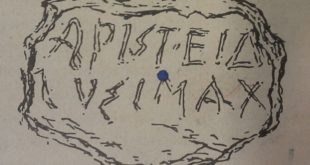The Ionian Greeks, who lived on the coast of Asia Minor and the adjoining islands, had produced some of the leading poets and thinkers of the Greek world. Thales of Miletus (640-546 B.C.) predicted an eclipse of the sun and introduced geometry to the Greeks. Pythagoras of Samos (c. 500) won fame as a philosopher and mathematician, although it is not now thought that he discovered the geometrical truth which bears his name (i.e. that the square on the hypotenuse of a right-angled triangle is equal to the sum of the squares on the other two sides). Thales was interested in politics as well as mathematics and tried to unite the cities of Ionia into a federation. Each city-state would have renamed independent but would have sent representatives to a council to discuss affairs of common interest. This scheme did not succeed. The Ionian cities of the mainland (except for the largest, Miletus) became subject to Lydia and later, when Cyrus conquered Croesus (p. 21), they all became subject to Persia. Even some of the islands succumbed. Polycrates, the fabulously wealthy tyrant of Samos, whose position was such that he could enter into a treaty with the king of Egypt, was enticed by the Persians onto the mainland and killed (522). In the year 522 a pretender had seized the throne of Persia and some nobles, of whom Darius was one, joined in assassinating him. They then decided that they would ride out early in the morning and that the one whose horse neighed first after the sun rose should be King. Darius’s groom saw to it that his master’s horse neighed first and Darius became King of Persia. Neither fate nor the other nobles punished him for cheating in this way. He ruled Persia until 485, by no means …
Read More »Athenian Democracy
The heroism of Harmodius and Aristogeiton was a myth, but Athenian democracy was not. In the two great wars of the fifth century — the Persian and the Peloponnesian — the Athenians clearly felt they had what would now be called a “way of life” which was worth fighting for. Cleisthenes, although he was of nobler blood than Solon, gave more power to the poor than Solon had done. Nearly all Athenian citizens now had a vote in the Assembly, a body which approved laws discussed in the Council of Five Hundred. The Five Hundred were elected by the citizens and anyone over thirty could be a member. As well as taking his share in lawmaking and government a citizen also played his part as a juryman in seeing that justice was done. Even the archons could be brought to trial when their year of office was over, if they were thought to have misused their power. There was a kind of police force consisting of Scythian archers which Peisistratus had set up. But they were the citizens’ servants, not his masters. There is often a good deal of argument about what is meant by a “free” country. A useful test is to ask: Can police knock on the door in the middle of the night and take people away to death or imprisonment without a public trial? If this “knock on the door” question is asked about fifth-century Athens the answer to it would be: No. There were no secret police and there were no mysterious disappearances in the middle of the night. These privileges of citizenship, however, were not shared by everyone living in Attica. “An Athenian citizen” does not mean the same as “a resident in Athens”. Neither women nor slaves might vote and immigrants from other …
Read More »

